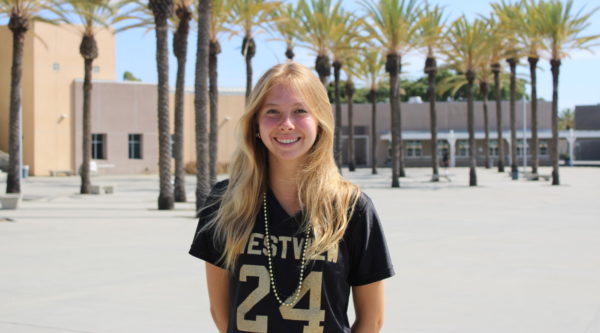Speech and Debate: Battle at Berkeley
March 17, 2023
“Good morning America. My name is Gina Yaweth. What you’re about to witness is unscripted truth. Eldon Phelphs has been given 1 million dollars and one week to spend it. At the end of the week he knows he will die. We recorded the week, this first clip is telling the wonderful news!“
With that ominous opening line of their scene, Cecilia Brown (11) and Sanchita Koppa (11) are off, acting out a condensed version of the play, “The Dead Guy” by Eric Coble. At the Speech and Debate competition, Feb. 19, the duo competed at the UC Berkeley 2023 Speech and Debate competition for the Duo Competition event. They paced around the Berkeley classroom, gesticulating their lines and fluctuating their voices to imitate their characters. Between pantomiming picking their noses to killing each other, the dramatic skit follows a new reality-TV show star who starts the week by winning a million dollars, and ends the week by being killed by the show’s producer.
Two months before the competition, the duo sat down with their coach and began to read, “The Dead Guy”. Practices commenced on Wednesday and Saturday mornings for weeks, until February 17th. The team flew up to the University of California Berkeley for the Berkeley 2023 Speech and Debate competition. Fifteen Westview students marched onto the college campus, suits donned and speeches at the ready, where they were met with a hundred other schools and thousands of other students. From New York, Hawaii, Colorado, and Northern California, the competition was stiff. Brown and Koppa and equally prepared. Brown and Koppa were committed.
Speech and Debate is, like the name might suggest, broken into two halves: Speech, and Debate. Within each category are a wide-variety of events, ranging from serious to theatrical, long to short. Some of the event’s competitors will spend months rehearsing, and others will improvise during the competition itself.
Brown and Koppa, in the Speech bracket, were rookies to their event, Duo Interpretation. They would compete against 52 other teams, graded based on who could convey the meaning, or interpretation, of their selected piece of published work the best through their acting. Working together, Brown and Koppa would act out their scene and bring it to life before the judges’ eyes. The rounds were held in Berkeley classrooms and auditoriums, and were filled with the competitors, six to seven judges, and spectating teams. The rules are strict: during their speech, there can be no eye-contact or touch exchanged, nor any props used between the duo. There’s a ten minute time-limit, and the closer to ten minutes, the better. As they composed themselves before their performance, nerves ran high.
“It’s really more of a mental block, really, since it was very new that first time and I wasn’t quite sure what to expect, although doing a partner event is great in the way that you have a built in support system. It’s a lot easier to feel calmer and less anxious when you’re performing with a friend,” Koppa said.
As their first of three preliminary rounds began, Brown and Koppa started their performance, acting out with emotion and conviction their scene to the judges. At the end of the first round, they realized that they had sped through the scene due to nerves, and made sure to slow down to stretch out the scene to their time goal of eight to nine minutes. Every second of pantomiming helped them reach their goal and impress the judges.
Berkeley may have been the first (and last) away tournament of the season due to schedule conflicts with State and National Qualifiers, but it wasn’t Brown and Koppa’s first time performing for Westview Speech and Debate team. They had been members of the team as underclassmen, participating in the Original Oratory category of writing and presenting speeches. This was their first year doing Duos.
“We like Duo; it appealed to us because we didn’t have to write anything, and we were interested in doing more light-hearted and humorous interpretation for Duos,” Brown said.
After extensive search for a speech, Brown and Koppa decided on “The Dead Guy,” with an argument about the media.
“We were performing “The Dead Guy”, which is a satirical play by Eric Coble, criticizing the culture of American reality TV,” Koppa said.
To prepare for the competition, they learned the script, set up blocking, and began designing their characters.
“We wanted to base our characters off of personalities that we could try to simulate. So we based Eldon, the ‘dead guy’, off of Jason Mendoza from the Good Place, and Gina, who was the hostess, off of Mr. Beast,” Brown said.
They practiced developing characterization by imitating their characters’ voices and trying to get into their characters’ mindsets for a more immersive experience for their judges.
While Brown and Koppa didn’t ‘break’, or make it past preliminaries onto semifinals, they described that they still found value in the trip. The competition wasn’t all business. Between rounds and after their work for the day was done, the team was free to roam the area and spend time bonding with each other.
“We definitely gained a lot of new friends from the whole trip, and a much better understanding of our event. It was a great learning experience, something we can definitely use to do better next time” Koppa said.
“I think Westview is good because they treat tournaments as not only competitions, but as an experience that you can learn from,” Brown said. “I think that’s a good culture to foster because it became more of this is what we’re doing because we love it, and not because we needed to place.”


